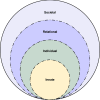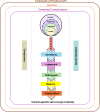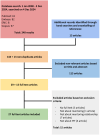The impact of mentoring relationships on professional identity formation in medical education: a systematic review
- PMID: 40253352
- PMCID: PMC12008893
- DOI: 10.1186/s12909-025-07158-y
The impact of mentoring relationships on professional identity formation in medical education: a systematic review
Abstract
Background: The promise that enduring and personalised mentoring relationships shape how mentees think, feel and act as professionals, or their professional identity formation (PIF), and thus how they interact, care and support patients and families has garnered significant interest. However, efforts to marshall these elements have been limited due to a lack of effective understanding. To address this lacunae, a systematic scoping review was carried out to map current knowledge on mentoring relationships and its impact on PIF.
Methods: Guided by PRISMA guidelines and the Systematic Evidence-Based Approach (SEBA) to ensure a consistent and reproducible review, independent searches and appraisals of relevant articles published between 1st January 2000 and 4th December 2024 on PubMed, Embase, ERIC and Scopus databases were performed. Data from included articles were content and thematically analysed. Related themes and categories were combined using the SEBA methodology.
Results: 248 articles were identified across four databases and snowballing of key articles. A total of 27 articles were included. The domains identified were: (1) the mentoring ecosystem; (2) mentoring dynamics; (3) shifts in belief systems and professional identity; and (4) complex adaptive systems.
Conclusions: The mentoring programme can be seen as a mentoring ecosystem, functioning as a community of practice and supporting the socialisation process within its boundaries and along the mentoring trajectory. The culture and structure of the mentoring ecosystem help inculcate the shared belief systems and programme identity. It also nurtures stakeholder investment and commitment, as well as their internal compass which is key to contending with the complex array of influences upon their development. Through the lens of a complex adaptive system, it is also possible to appreciate transitions between roles and responsibilities and the notion of being and becoming. These findings underline the evolving nature of practice and the need for personalised and longitudinal mentoring support.
Keywords: Community of practice; Medical schools; Medicine; Mentoring; Mentoring relationships; Personhood; Professional identity formation; Socialisation process.
© 2025. The Author(s).
Conflict of interest statement
Declarations. Ethics approval and consent to participate: Not applicable. Consent for publication: Not applicable. Competing interests: The authors declare no competing interests.
Figures
Similar articles
-
A systematic scoping review of mentoring support on professional identity formation.BMC Med Educ. 2024 Nov 27;24(1):1380. doi: 10.1186/s12909-024-06357-3. BMC Med Educ. 2024. PMID: 39605048 Free PMC article.
-
Assessing the effects of a mentoring program on professional identity formation.BMC Med Educ. 2023 Oct 25;23(1):799. doi: 10.1186/s12909-023-04748-6. BMC Med Educ. 2023. PMID: 37880728 Free PMC article.
-
Professional identity formation amongst peer-mentors in a research-based mentoring programme.BMC Med Educ. 2023 Oct 24;23(1):787. doi: 10.1186/s12909-023-04718-y. BMC Med Educ. 2023. PMID: 37875886 Free PMC article. Review.
-
Assessing professional identity formation (PIF) amongst medical students in Oncology and Palliative Medicine postings: a SEBA guided scoping review.BMC Palliat Care. 2022 Nov 18;21(1):200. doi: 10.1186/s12904-022-01090-4. BMC Palliat Care. 2022. PMID: 36397067 Free PMC article.
-
The role of mentoring, supervision, coaching, teaching and instruction on professional identity formation: a systematic scoping review.BMC Med Educ. 2022 Jul 8;22(1):531. doi: 10.1186/s12909-022-03589-z. BMC Med Educ. 2022. PMID: 35804340 Free PMC article.
References
-
- Cruess RL, Cruess SR, Boudreau JD, Snell L, Steinert Y. A schematic representation of the professional identity formation and socialization of medical students and residents: A guide for medical educators. Acad Med. 2015;90(6):718–25. - PubMed
-
- Sarraf-Yazdi S, Goh S, Krishna L. Conceptualizing professional identity formation in medicine. Acad Med. 2023;99(3):343. - PubMed
-
- Krishna LR. Towards an evidence based approach to novice mentoring in academic clinical practice: Lessons from internal medicine and practical applications for palliative medicine [thesis]. 2022.
Publication types
MeSH terms
LinkOut - more resources
Full Text Sources






